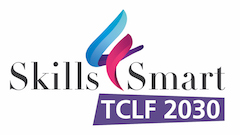Background & Blueprint
These days, technological progress and globalisation are continually reshaping the foundations of the industry and the global economy. This phenomenon requires skilled and adaptable persons who are able to adapt to a constantly changing work environment.
With the aim of delivering sector-specific skills solutions, the New Skills Agenda of the European Commission launched the Blueprint for Sectoral Cooperation on Skills. The Blueprint is a framework to develop strategic cooperation between the existing key stakeholders of each economic sector (i.e. companies, education and training providers, research institutions, public authorities, trade unions, etc). In the concrete case of Skills4SmartTCLF, the project covers the Textile, Clothing, Leather and Footwear industries.
The main aim of the Blueprint is to develop concrete actions in order to satisfy short- and medium-term skills needs to support the overall sectoral strategy, building on the previous work done by the European Commission and the sectoral partners, in particular the Sector Skills Councils and the European Sector Skills Alliances.
Mission
The project “Skills4Smart TCLF Industries 2030” constitutes the first step into a new dynamic sustainable community of diverse private/public actors committed to support skills development and employment opportunities across EU in the Textile, Clothing, Leather, Footwear and Leather Goods sector, which are indispensable to innovate and produce high-added value products.
The project aims to enhance the modernisation and competitiveness of the EU Textile, Clothing, Leather, and Footwear (TCLF) sectors through the development of a sustainable upskilling and reskilling strategy, which is supported by a communication campaign to attract social, economic and political actors.
- Project Start Date: 1/1/2018
- Project End Date: 31/12/2021
- Project Total Duration: 48 months
Objectives
- The identification of concrete actions and tools in order to anticipate and match skills’ supply with demand,
- The improvement of skills intelligence and information mechanisms by creating networks and partnerships,
- The enhancement the attractiveness of the sector to engage newcomers, families, companies, and policy makers at regional, national and EU levels,
- The creation of a network of VET providers, public authorities, and other stakeholders working together on skills development for the modernisation and growth of these sectors,
- The engagement of regions and private stakeholders promoting skills and innovation in TCLF sectors in order to ensure the project outcomes sustainability.
Activities
- Identification of a sector education and VET providers’ map registering, showcasing and indexing, including 50 institutes (Year 1) to reach at least 150 key contacts (Year 4) with their activities, place, language, curricula, certification, current interests for cross- collaboration, projects and search for partners
- Preparation of four yearly reports integrating the conclusions of the focus groups and interviews involving companies and VET providers with an ongoing presentation of all work done
- Identification of 8 new TCLF job profiles – and corresponding curricula (EQF and ECVET based) in line with the sector changing needs in the short to longer term.
- Description of existing MOOCs/VOOCs dedicated or useful to the sector
- Design of 8 new courses including MOOCs/VOOCs or MOCs (part online/in school) or serious games or similar tools,
- Pilot implementation with a minimum of 100 trainees per online curriculum, 10 trainees per country per traditional curriculum, and 5 trainees per company per country for practical curricula
- Creation of a databank storing all relevant research, pilot projects and best practices carried out in the sector to reach the objectives set by the project
- Development of a Promotional Plan for the TCLF sector
- Creation of a Network of VET providers in EU, and signature of a Memorandum of Understanding by at least 20 institutions at the end of the project
- Creation of a Network of EU Regions committed to invest on upskilling to enhance innovation for a future “Smart Specialisation Platform on Industrial Modernisation of TCLF” and signature of a MoU by at least 6 regions from 6 MSs.

